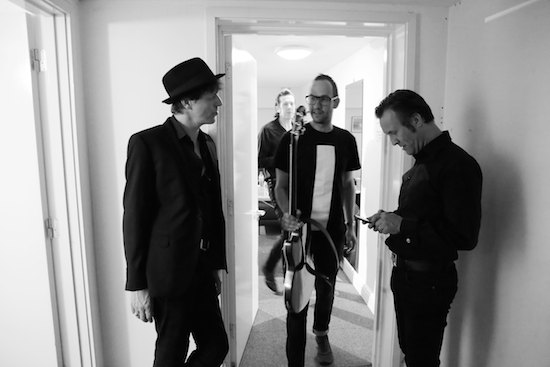It’s an uncommonly cloudless and warm Thursday morning in October where it feels as if the summer is never going to end and Jim Jones is exhausted.
The previous night The Jim Jones Revue had played a rammed show at The Trinity in Bristol as part of their Last Hurrah Farewell Tour. A converted church, the venue is devoid of any air conditioning and the combination of a packed capacity crowd and the high energy levels that have come to be synonymous with the band have led to the rising of temperatures and the gradual erosion of air. At the end of the second number, the band is already soaked through with sweat. By the time they reach their encore, oxygen is at a premium while the band reaches deep within itself to find the necessary reserves to bring them to the climax of another explosive gig. Running a tight ship, the band elects to return to its London base rather than splashing out for a hotel. Having arrived home shortly before dawn, Jones has managed to grab around three hours’ sleep before rousing himself to continue with the campaign.
Eating breakfast in a café next door to their Hackney studio, he shakes his weary head as he recalls the events of the previous night. "Fucking hell!" he exclaims. "I wasn’t sure we’d make it to the end. My body and head was all over the place by the time we’d finished so I needed just five minutes on my own to get myself together. I ducked out of the venue and there was a tree round the back so I thought I’d go and sit under that. Turns out that’s where people go for a slash. Some bloke was about to piss on me until he recognised me and then he goes, ‘Can I have your autograph please?’ I’m like, ‘Mate, just give me a minute please…’"
It’s an absurd scenario but then again, ever since it emerged kicking and screaming from the primordial swamp, the best rock & roll has not only embraced absurdity, it’s positively revelled in it. Just check the hip swivelling of Elvis in his youthful prime, Chuck Berry’s duck walk and the androgynous leer of Little Richard. Moving further on you’ve got the self-laceration of Iggy Pop, Angus Young’s schoolboy outfit and The Ramones’ uniform of leather jackets, ripped jeans and bowl haircuts and it’s a tradition that’s continued to this day in the grubby and grimy leer of The Fat White Family, a band seemingly about to drop dead onstage yet still capable of delivering the goods. Absurdity is precisely what elevates rock & roll from the mundane and the humdrum, the grind of punching the clock or begging for scraps to survive. And even when it does collide with real life, as in the case of The Clash, the very notion of sticking it to The Man with a guitar is as ridiculous as it can be effective.
Ergo The Jim Jones Revue. As if forming a band when the principle players were older than when Elvis strained terminally on his toilet wasn’t daft enough, the fact that they play it straight with an energy and ferocity that bands half their age struggle to achieve after three nights on the road simply adds to the thrill. Playing at a near punishing volume, thus increasing the ludicrousness of the scenario, is the icing on the cake. But here’s the thing: like a good hit of acid, there comes a point when you break through the absurdity and see things as they really are. This is the pure, neat and undiluted good stuff.
This writer’s first encounter with The Jim Jones Revue occurred in the upstairs room of a Leytonstone pub at the end of 2009. Interest was piqued before a note had been played. Making their final preparations before taking the stage area, Jones and guitarist Rupert Orton were gaffer taping beer crates in front of small tables situated on either side of the PA. The reason became clear the moment they detonated their first number. As bassist Gavin Jay, drummer Nick Jones and erstwhile keyboardist Elliot Mortimer held down the rear, Jones and Orton leapt out of the traps, stepped up the crates and onto the tables and let rip with a volley of filthy riffing, their guitars held at 45 degrees. Within seconds, chairs and tables were upended and flung out of the way as the 100 or so souls in front of the stage erupted into a mass of jumpin’ and jivin’ loons, dancing as if the world was going to end at midnight. The music, an intoxicating and exhilarating collision of Little Richard’s elemental rock & roll and the sonic fury of The Stooges mixed with a testifying fervour, was delivered at ear-popping volume levels via stacked amps and speakers usually found in arenas. By all counts, the PA barely survived the evening. But even at this early stage it was apparent that the band would break through to a wider audience.
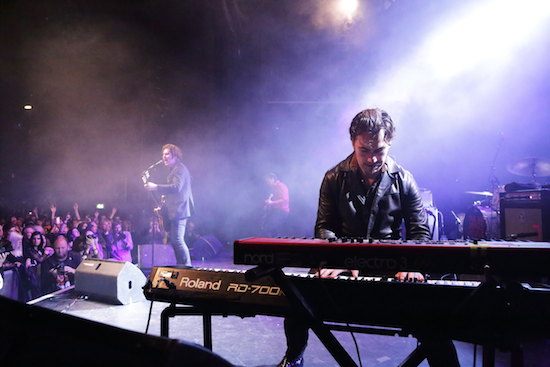
Amazingly, The Jim Jones Revue managed to capture the frenzied fury of their live shows on their eponymous debut album more through accident than design. Recorded live on a Portastudio in their Camden rehearsal space in just two days, Jones’ unorthodox mixing methods resulted in an all-killer, no-filler blast of white heat that found unexpected support.
"The recording was alright but it lacked a bit of hi-fidelity and excitement and I made up for that by EQing it and turning up the gain on everything until was, ‘Alright, it might be a bit noisy but at least it feels exciting now,’" he tells The Quietus a few weeks ahead of The Last Hurrah tour. "My way of mixing was that everything was loud and if something needed to be louder then it it’d be louder again until at some points it would just degrade to white noise. I thought it was quite funny so when they played it on BBC 6 Music’s Steve Lamacq show we were like, ‘Whoah! Are you kidding?’ But it turns out they liked it because it sounded different from anything else."
Not that Jim Jones was a novice. The singer first came to prominence in the early 1990s with the Detroit rock-influenced Thee Hypnotics before going on to form soul rockers Black Moses after their demise. It was during the latter band’s disintegration that The Jim Jones Revue began to gestate.
"The last few shows of the Black Moses era, I didn’t know it was the end of it," says Jones. "The guy who was on bass was gradually getting more and more drunk at shows and I would find myself on a chorus and he was still on the second verse because he was so out of it. It kind of died a death."
Rupert Orton, who promoted the last Black Moses show, remembers the gig. "It was at the Buffalo Bar. I was doing the door and I could hear this really crazy bass playing going on and I thought that maybe they were moving into a Can-type direction. I went downstairs to have a look and it turns out that the bass player was completely pissed and the sounds he was making was because he was falling about all over the place."
Jones continues: "I talked with Rupert afterwards and he asked, ‘Well, what are you gonna do now?’ and I said, ‘Well, I have this idea of doing a series of short projects and the first of these will be a rock & roll one because I know I can put it together fairly quickly’ and Rupert was like, ‘Alright…’"
Orton, then a club promoter and booking agent, recruited drummer Nick Jones, formerly of 90s Creation band Heavy Stereo with whom he’d played with in short-lived band Gaffer Hexam. The next element was the keyboards.
"I knew that I wanted a piano; that was an important part of it and I’d met this guy Elliot Mortimer through Thee Hypnotics’ Ray Hanson," says Jones. "Elliot had occasionally played for Morcheeba and the Tabernacle Choir. Despite him being good he was the only piano player I knew so I got him to come down and play. We played Little Richard’s ‘Hey Hey Hey Hey’ and it sounded really good straight away."
Even in the early days of The Jim Jones Revue, the impact they were making at club gigs was apparent.
"I made a recording of ‘Hey Hey Hey Hey’ and played it to a couple of friends and one those was Paul-Ronney Angel from Urban Voodoo Machine," remembers Jones. "It was just at the beginning of his night, Gypsy Hotel, and he said, ‘Come and play!’
"When we finished playing, all these people were coming over and going, ‘Listen, I’ve got a party next week and it’d be great if you guys could play’ and it took off really fast."
Yet despite the word of mouth that spread in the wake of the band’s impossibly exciting live shows, industry support for The Jim Jones Revue was minimal. Realising that if they were to make any headway, the band would have to make things happen for themselves.
Jones shakes his head as he recalls the wall of indifference The Jim Jones Revue was up against but is fulsome in his praise of Rupert Orton’s work as manager.
"Nobody in the industry wanted to know or touch us. But we got a system together and this is when Rupert really shines. He’s worked as booker and a promoter and as an agent and he’s had a very clear and educated view of how things work. He’s a workaholic. It was like we were heading down one road and the industry would be like, ‘No, you can’t do that’ so we’d find a back route and say, ‘Well, if we do things ourselves and book the show and put the record out ourselves…’ and then we’d move on to the next problem.
"Because we didn’t have a label, we could sit in the van and go, ‘Right, we’ve earned this much – how much does it cost to go to America next month for a load of gigs?’ and so we’d just go and book the tickets and do it.
"At first we talked about management and what it boiled down to was, ‘Are we going to find someone who cares about it more than you do?’ and the answer was usually ‘No’ so he assumed the position of manager. He’d be on the phone all day, put the laptop down and then get on stage and play. And then the next morning he’d be up and do it all over again."
A self-contained and fiercely independent unit determined to do things on their own terms, The Jim Jones Revue set about blazing a trail through a campaign of combustible live shows that saw their reach go beyond the shows of the UK.
"Very early on when we were doing shows at places like the 100 Club, we went to France and did this festival. We went on after Lenny Kravitz and played to 35,000 people," beams Jim with no little pride.
The band was canny enough to realise that they’d have to seek outside help with any further recordings. Though their violently mixed debut album had made the necessary shock waves, its sonic limitations couldn’t be repeated without the band painting itself into a corner.
Say Rupert Orton: "We were in a club in Helsinki when the DJ played some tracks and all you could hear was white noise. We knew we’d have to do something about that for the next record."
Though The Blues Explosion’s Jon Spencer had been mooted as producer, help arrived in the form of Bad Seeds drummer Jim Sclavunos.
"Jim Sclavunos had come to some of our gigs," says Jim. "We told him that we wanted to do another record. Straight off the bat he said, ‘I’m interested in working with you’ and he was immediately like, ‘What’s your budget? What’s your time window? What studios would you ideally like to work in?’ And that was the start of a great relationship."
"Jim came from a different angle. He knew what I was getting at. He was interested in distorted sounds but he liked a clean sound and while we didn’t fight there was a fair amount of push and pull going on."
The result was the band’s second album, Burning Your House Down, a record that succeeded in capturing the raw power of the band’s live sound while offering a greater degree of sonic clarity. However, while the album found the band gaining a wider audience across the globe, including a coveted slot on The Letterman Show, a perfect storm of an increasingly punishing tour schedule and personal circumstances took its toll on keyboardist Elliot Mortimer.
Using hired hands replace Mortimer and fulfill the dates in Australia and America, The Jim Jones Revue was acutely aware of the need of a formidable pair of hands to tinkle and bash the ivories to the almost impossibly high standards that they’d set themselves.
"We’d seen Henri Herbert and thought he was really good," explains Jim. "Plus he was young and when we said that we were going to be touring for six months he was like, ‘Great! Lets do it!’"
Henri certainly made his presence felt on the band’s third and final album, The Savage Heart. Their most accomplished to date, it was filled with the kind of space that would’ve been unimaginable during their earliest incarnation as they explored new musical territories.
So why have the band decided to call time?
"Lots of different reasons," says Jim. "At the end of the day, everyone’s ready to do something different.
"And when conversations start about, ‘I don’t know how much longer I can keep this up’, it’s not because they don’t love it, it’s because they’re tired and it takes a lot out of you. And it gets to the point where everyone is saying the same thing: ‘I need a break.’"
Importantly, there’s no regret; only pride. The decision to split was made as a group and The Jim Jones Revue have elected to celebrate rather than commiserate their achievements with The Last Hurrah Farewell Tour.
"This vehicle has been an incredible experience," grins Jim. "A while back, we said that if things started to disintegrate then we’d rather split it rather than carry on like some sad joke. We said, ‘Let’s do one last tour and give it one last good hit and go out on a high and leave it with a clean record.’"
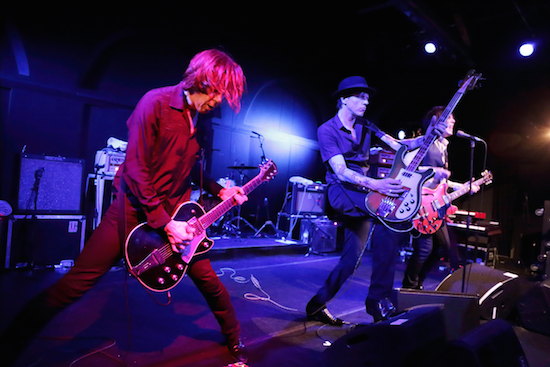
Fast forward to that balmy Thursday morning and Jim Jones, Rupert Orton and Gavin Jay are meeting outside the tour bus as they prepare for the last three dates of The Last Hurrah tour. Tour manager Greg Hilson, the last man to bed and surviving on just three hours’ sleep after last night’s gig, has just managed to convince a traffic warden to not issue a parking ticket. Rupert Orton, a man with one eye on the figures and the other on the fretboard, nods his approval. This is a man who likes to keep things under control and one not prepared to tolerate any deviation from the gameplan. We’re barely out of Hackney and already he’s has opened his laptop to field requests for guest list places and interview slots. Similarly, his mobile phone pings with a regularity you could set your watch by.
The Last Hurrah has been on the road now for three weeks. The levels of exhaustion are palpable. Jim has made himself comfortable with a pillow under his head while Gavin Jay stretches his long legs on the seat in front of him. As we crawl through the City to pick up Nick Jones and Henri Herbert, the realisation creeps in that the bits between the gigs – the endless driving and gazing from van windows at the changing scenery – are fundamentally a pretty boring business. Some people manage to snatch a few minutes sleep, others check out social media or read e-books.
So while the travelling offers little by way of excitement, what is apparent is the level of camaraderie. Jokes and quips are frequently exchanged and any suspicion that bad blood might be flowing in the wake of the band’s decision to split is soon dissipated.
It’s interesting to watch the band’s internal dynamic at play. With Orton handling the business end of things, the rest of the band is safe in the knowledge that they’re not going to get fucked over. They can relax and conserve the last of their energy levels for the task of delivering explosive shows over the next three nights.
The venue is the gorgeous Old Market Theatre in Brighton, and any doubts that this exhausted band can deliver the goods are soon blown out of the water come show time. The Jim Jones Revue is on it from the moment they hit the stage with ‘It’s Gotta Be About Me’ and the sold out crowd is reeling from the onslaught. Gavin Jay, his bass slung so low as to make Peter Hook look like he’s playing for Level 42, prowls the stage from side to side and back to front. Rupert Orton’s well-chiselled quiff falls apart around midway through second number, ‘Never Let You Go’, and the crowd finally catches up with the band during a particularly frenetic ‘Where Da Money Go?’ By this point, the band is moving all over the stage. Not for them lines of demarcation; this is total rock & roll and they weave and move around each other to utilise every inch of space that the stage has to offer whilst connecting with an ever-increasingly excitable audience.
Shedding his guitar, Jones grabs the mic stand and his face is contorted with rage, joy, pain, ecstasy and all points in between. He reaches deep within himself to pull out not just more energy that you wouldn’t have thought that was there but also that shredded voice that hollers and howls with deadly precision.
Someone in a wheelchair has managed to position himself in the thick of the heaving moshpit and is having as good a time as everyone else, and by the time they finish with a coruscating reading of ‘Princess And The Frog’ the audience is spent.
Down in the dressing room the band is sopping wet with sweat. Jim Jones wraps his shirt in towel and wrings it dry. Others are catching their breath while some simply stare into the middle distance as they attempt to get their consciousness into some kind of order. But it’s still not over. Rubbing their heads with towels and changing into fresh clothes, the band heads back upstairs to chat with the fans that have waited for them to sign merchandise.
"It’s the fans that make it," explains Rupert as he catches his breath. "Of course we’re going to spend some time with them."
By the time we jump back in the van to head back to London it’s gone 1am and we finally hit London around 4am.
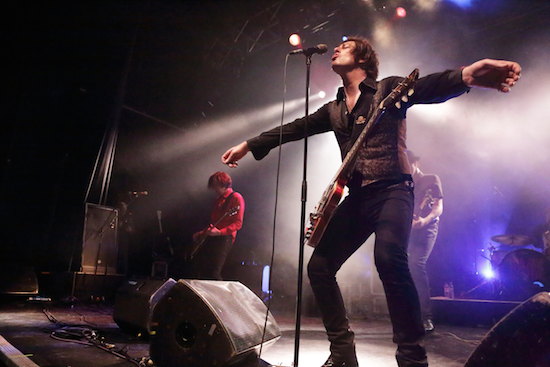
The gig at The Open in Norwich has been upgraded from the venue’s small club to the main hall after tickets sold out in the blinking of an eye.
Stepping inside, we’re met with a stupendous sight. Originally built in 1790 as a bank, the main hall is a vast and beautiful space adorned with pillars and a high domed ceiling. The huge stage proves to be a perfect dry run for the final show. This being a late show the pressure is off when it comes to soundchecking but in another respect it’s on: Rupert Orton was raised in Norwich and this is as much a homecoming for him as tomorrow night’s gig at The Forum in London will be for all of them.
Come 10.15pm and the packed venue is heaving with excitement. Any notions of tiredness are tossed aside as the band makes its way from the dressing room to the stage door.
"Norwich: The Last A-ha!" quips Gavin Jay.
The intro music is soon drowned out by the baying crowd which roars its approval the moment the local boy takes the stage, his arms held aloft. Within seconds the band are tearing through ‘It’s Gotta Be About Me’ and the increased levels of passion and energy are keenly felt throughout The Open. There’s a greater sense of fervour about tonight’s show and the larger stage is milked for all it’s got. Jones moves from one side to another, exhorting as he goes. One moment he’ll have his hands on hips, the next he’s on his knees as hands reach out from the audience to tussle his hair or stroke his thighs. The audience is reeled in much quicker this evening and the grind of ‘Burning Your House Down’ has caused a heaving mass at the lip of the stage.
Them something happens during the encore. It’s as if a switch has been flipped to turbo and the band plays with intensity not thought possible. Henri is pounding at his keys with such power that it looks as if they could turn to dust at any moment as Jones fans him with a towel. Nick Jones’ kit takes a hammering as Rupert Orton leaps around as if his shoes are on fire. This is catharsis and celebration for both band and audience.
Backstage, Jim Jones is once again wringing his soaked shirt in a towel while Rupert Orton attempts to re-sculpt his quiff. Gavin Jay is sat at a table, his head resting in his hands as he gives off the thousand-yard stare of a man who might be running on empty. Henri sits in a chair catching his breath while Nick grabs himself a well-earned beer. Once again, their moment of respite is short-lived as, dried off and sporting fresh clothing, the band heads off once again to meet its fans. Looks like it’s going to be another long night…
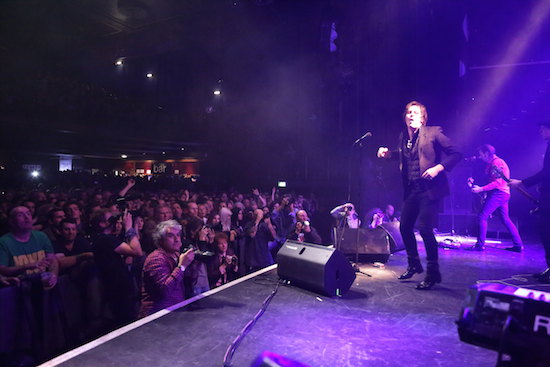
"Fucking hell!" gushes Rupert Orton. "I’ve just played with Walter Lure! This is only the soundcheck but I’m already buzzing as I’ve played the gig!"
He’s not the only one. The Quietus watches as The Jim Jones Revue runs through ‘Chinese Rocks’ with the former Heartbreakers guitarist who has been added to tonight’s line-up and even in an empty Forum it sounds electrifying.
"So what happened at the end of that?" I ask Orton, referring to the final exchange between him and Lure at the end of the song. "Did he show you what the final chord was?"
"No," replies Orton laughing. "I had to show him!"
It’s a moment that’s emblematic of the rising levels of excitement as The Jim Jones Revue moves inexorably towards its inevitable demise. Though nothing is explicitly stated, there is a frisson of tension in the air with the realisation that time is running out.
We manage to grab some time together in the dressing room to take stock of what’s happening. What are the emotions going through the band knowing that they’ve almost reached the end of the road?
"I’m really excited but in the back of mind I’m thinking that this is like an Evel Knieval type thing," replies Jim. "This is going to be really fucking good but I haven’t really thought out the landing!"
It certainly has been one fuck of a ride. But to what does the band attribute its success? For Jim Jones, it’s all about commitment and hard work.
"We weren’t mates when we got the band together but for whatever reason we all shared the commitment about what we thought this band was," he explains.
"I think this is an opportune moment to give a little bit of insight," adds Rupert. "It’s a unique combination where you’ve got a musician who’s essentially Jim and a business person who is me working in a band together to a greater degree in harmony and that means we’ve been able to cover each others’ weaker spots and compliment the stronger spots."
After all these years, what will the band take away the most from The Jim Jones Revue?
"I’ve been given faith in what you can achieve if you really put your mind to it and don’t take ‘no’ for an answer," states Jim emphatically.
"For me, it’s like a deep psychological fulfillment," says Rupert after pausing for thought. "It’s a dream that I’ve always had that I never knew was possible in reality. I feel privileged and lucky enough to have been able to do that."
Considering their legacy they both arrive at the same conclusion.
"I think we changed a lot of people minds," says Jim. "They were like, ‘Look at them! Look at what they’re doing!’"
Rupert agrees: "In our own way we achieved what we wanted to do and that’s to make an exciting rock & roll band that’s meaningful."
The excitement in The Forum is reaching fever pitch. As the lights fade and the intro music comes on, the roar from the fans reaches its crescendo as the band bursts on to the stage and tears into ‘It’s Gotta Be About Me’. If the previous two gigs saw the audience taking its time to warm up to the band, here it kicks off right from the start.
Any notion that the 20-date European tour has taken its toll on the band is ground into so much dust underneath Jim Jones’ stomping boot heel. The energy that spews out from the stage is almost a physical entity that can be reached out, touched and held – a moment of communion.
The set is perfectly paced as it slowly and methodically turns up the screws. They bring things up with ‘Burning Your House Down’, offer a mutated form of respite in the shape of ‘Chain Gang’ before charging ahead with ‘7 Times Around The Sun’ as Henri’s boogie-woogie keys lock in with Nick Jones’ brushed and stomping beats. But it’s when Jim hollers, "STOP WHAT YOU’RE DOING AND ABANDON SHIP!" on the headlong rush of ‘Rock & Roll Psychosis’ that the joint truly erupts. The band is at full pelt and the orgasmic rush that fills the venue proves utterly irresistible.
Walter Lure joins them for ‘Chinese Rocks’ before the band returns to its roots to detonate the climactic ‘Princess And The Frog’. The wave of emotion that sees the band with arms aloft when not around each other engulfs the venue. There are smiles all round and the cheering continues long after the band has left the stage.
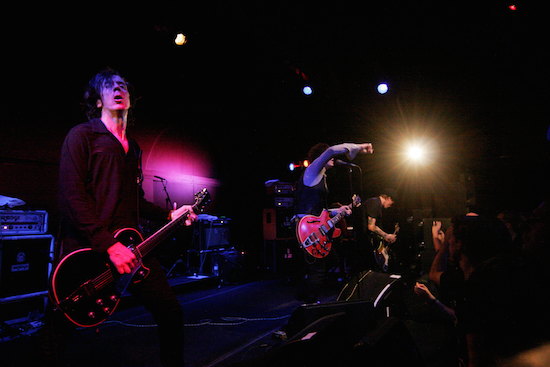
A few years back, a friend of mine opined, "The Jim Jones Revue? They’re just 50s rock & roll." A disingenuously dismissive view at best, it totally missed the point of the band. So much of that first generation of rock & roll holds up remarkably well and it’s impossible not to feel an electrical surge that hurtles down the cerebral cortex to the all-important area of hips and feet. Just slap on Little Richard’s ‘Tutti Frutti’ and see how long you can stand still for. That’s why, every few years, guitar-based music takes a reductive view and boils down to its most elemental components as it consolidates and coalesces before re-building itself again, which is precisely what The Jim Jones Revue have done.
The Jim Jones Revue is dead. Long live The Jim Jones Revue.

